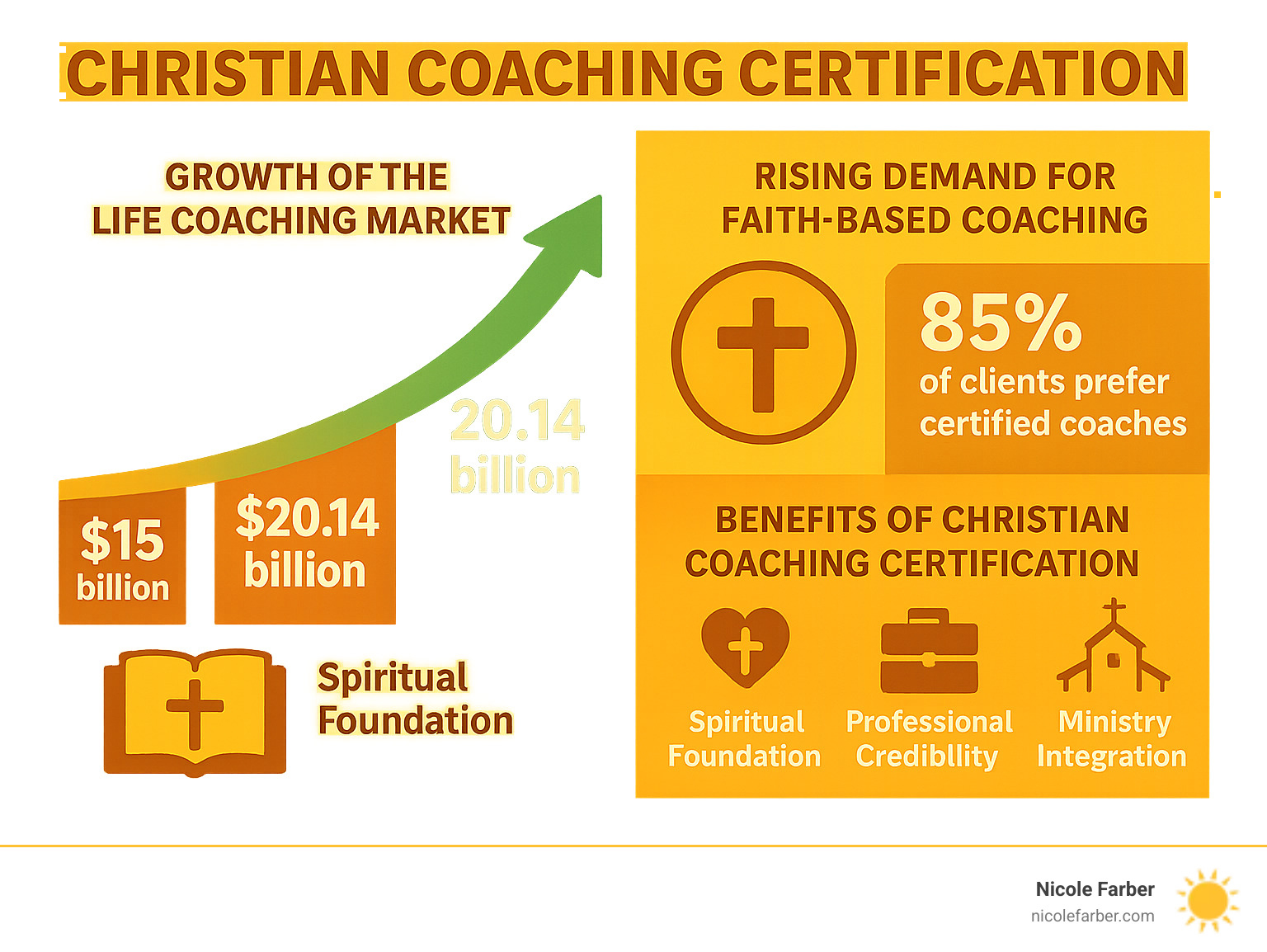Unlock Your Ministry: Christian Life Coach Training and Certification Explained
- Faith
- In the News
- August 6, 2025
Answering the Call to Coach

Christian coaching certification is a formal credential that validates your ability to guide others using faith-based principles and biblical wisdom. This specialized training combines professional coaching skills with Christian values, preparing you to help clients align their goals with God’s purpose for their lives.
Quick Overview of Christian Coaching Certification:
- What it is: Professional training that integrates coaching techniques with biblical principles
- Who offers it: Various faith-based organizations and universities
- Time required: Typically 24-140 hours of training, depending on certification level
- Cost range: From $149 for basic programs to over $650, plus application fees
- Key benefits: Credibility with clients, professional competence, and spiritual foundation for practice
- Career paths: Private coaching practice, ministry improvement, corporate leadership roles
The coaching industry is experiencing explosive growth, and within this boom, faith-based coaching stands out. People are increasingly seeking guidance that honors their spiritual beliefs alongside their personal and professional goals.
As one Christian coaching expert notes: “Has God called you to serve Him by supporting, encouraging, and inspiring others?” This calling resonates with many believers who feel drawn to help others but desire a structured, professional framework for their ministry.
Whether you’re a business professional in Philadelphia, a ministry leader in Wilkes-Barre, or someone called to serve in communities from New Orleans to Antigua Guatemala, Christian coaching certification provides the foundation to transform your gift of encouragement into a powerful ministry tool.
I’m Nicole Farber, and through my 15+ years of business leadership and faith journey, I’ve witnessed how Christian coaching certification can transform both the coach and those they serve. My experience guiding organizations has shown me the profound impact of faith-driven leadership.

Simple guide to christian coaching certification terms:
The Calling: What is Christian Coaching and Why Get Certified?

As a Christian coach, you help people who are stuck move beyond their personal goals to find what God wants them to achieve. Christian coaching helps people move from where they are to where God wants them to be. It uses powerful questions, biblical wisdom, and prayer to help clients find their own answers and align their lives with God’s plan, whether they’re a business owner in Philadelphia or a ministry leader in Wilkes-Barre.
So why get a Christian coaching certification? Here are three compelling reasons:
Credibility: The 2022 Global Consumer Awareness Study found that 85% of clients consider certification important. Whether in New Orleans or Antigua Guatemala, clients seek a trained Faith-Based Life Coach they can trust.
Competence: Certification teaches you to ask the right questions, build trust, and use proven techniques to create lasting change within a biblical framework.
Confidence: Knowing you have the spiritual foundation and professional skills to serve effectively gives you the confidence to coach boldly, from Luzerne County to anywhere in the world.
The Role of Faith and Biblical Principles
What sets Christian coaching apart is its Christ-centered lens. We integrate Scripture naturally into coaching, helping clients see how God’s Word applies to their specific situations. The Holy Spirit plays an active role, and we invite God into the process, relying on His divine guidance.
Our biblical worldview shapes everything. When a client faces a challenge, we don’t just ask, “What do you want to do?” We ask, “What might God be calling you to do?” This perspective transforms obstacles into opportunities for growth. As we explore in Walk by Faith Not by Sight, trusting God’s plan means stepping into the unknown with confidence.
Distinguishing Coaching from Counseling
It’s vital to understand that Christian coaching and counseling serve different purposes.
Coaching is goal-oriented and forward-looking. We help clients identify what they want to achieve and create action plans to get there, providing structure and accountability.
Counseling, on the other hand, is healing-focused and often looks at past experiences. Licensed counselors are trained to diagnose and treat mental health conditions like trauma, depression, and anxiety.
As Christian coaches, we stay within clear legal and ethical boundaries. We don’t diagnose or provide therapy. Instead, we empower clients to move toward their future. When deeper emotional healing is needed, we recognize this and refer clients to licensed professionals. You’re training to be an encourager and a guide in someone’s growth journey—not a therapist.
Navigating the Path to Your Christian Coaching Certification

Finding the right path to your Christian coaching certification is simpler than you might think. Most reputable programs now offer online, virtual training, meaning you can get certified from anywhere, whether you’re in Philadelphia, Wilkes-Barre, or even Antigua Guatemala.
Some programs are accredited by recognized coaching bodies, which provides broad industry recognition. Others are credentialed by Christian-specific boards that focus more on biblical integration. The best path depends on your personal goals and the communities you plan to serve, from New Orleans to international locations.
Core Curriculum for a Christian Coaching Certification
Every solid Christian coaching certification program builds on certain foundational elements.
- Foundational coaching skills: You’ll master active listening and learn to ask powerful questions that help people find their own answers.
- Biblical foundations and integration: You’ll learn to weave biblical truths and prayer naturally throughout your conversations, helping clients see how their faith intersects with their goals.
- Ethics and professional standards: You’ll understand important boundaries, confidentiality, and when to refer clients to other professionals.
- Goal-setting strategies and accountability: You’ll become skilled at helping clients define clear goals and providing the structure they need to follow through.
- Building a practice: Many programs include practical steps for launching and growing your coaching ministry or business.
Choosing the Right Christian Coaching Certification Program
Selecting your certification program is a personal decision. Here are key factors to consider:
- Accreditation: Consider if you want a program accredited by a major, global coaching organization or one credentialed by a Christian-specific board. The former offers broad industry recognition, while the latter emphasizes deep roots in faith-based approaches. Both paths have value, depending on your priorities.
- Time commitment: Programs vary dramatically. Some intensive courses can be completed in 30 days, while others stretch over six months to a year. Consider your learning style and life circumstances.
- Cost investment: Entry-level certifications might cost as little as $149, while comprehensive programs can run into the thousands. Cost doesn’t always correlate with quality; many impactful programs are ministry-driven and reasonably priced.
- Community and support: The best programs create ongoing relationships with fellow coaches. Look for programs that offer virtual networking, continuing education, and a Christ-centered community.
Your program should prepare you with the skills, confidence, and community support to fulfill your unique calling, whether you plan to serve entrepreneurs in Luzerne County or families in New Orleans.
Faith-Centered vs. Secular Coaching: Understanding the Key Differences
As a business leader who has worked with professionals from Philadelphia to New Orleans, I’ve seen how worldview shapes everything. This is especially true in coaching, where your beliefs determine your entire approach.
The key difference between faith-centered and secular coaching is the worldview. Christian coaching certification programs prepare you to work within a biblical framework from day one.
Secular coaching defines success by the client’s personal desires and societal standards. Christian coaching, while valuing those goals, ultimately helps clients find and align with God’s purpose for their lives. This sometimes means challenging clients to consider if their goals reflect God’s calling.
As a single mother who built a business, I know that our motivation as Christian coaches extends beyond worldly achievement. We help clients grow spiritually while pursuing earthly goals. When facing obstacles, we don’t just rely on positive thinking; we understand that Chaos Brings Opportunity and view challenges through a lens of faith. The Holy Spirit’s role is central to our process, guiding both coach and client toward deeper change.
Foundational Goals and Methods
The goals and methods of these two approaches are fundamentally different.
- Secular coaching goals center on client-defined success, like climbing the corporate ladder or improving skills. The methods are rooted in psychology and neuroscience—valuable but limited to human understanding.
- Christian coaching goals are broader. We help an attorney in Philadelphia advance their career, but we also ask, How does this align with God’s calling? How can this bring glory to Him? Our methods reflect this, integrating scripture and prayer as practical tools and relying on the Holy Spirit’s guidance.
Good Christian coaching certification programs teach both professional skills and biblical foundations, using them within a framework that acknowledges God’s sovereignty.
Ethical Frameworks and Values
Both secular and Christian coaching adhere to professional ethics like confidentiality and professional boundaries. However, Christian coaching adds biblical morality as another layer of commitment. Our integrity is about honoring God in how we serve our clients, demonstrating truthfulness, compassion, and love.
This creates a “faith-honoring space” where clients can be vulnerable without fear of judgment. Whether I’m working with someone in Wilkes-Barre questioning their career or a ministry leader facing burnout, this safe environment is where real change happens.
Operating from biblical values deepens trust and improves professional effectiveness. It also means we are committed to staying within our scope of practice. We aren’t pastors or counselors, but we can pray with clients, share scripture, and help them discern God’s voice in their decisions.
From Calling to Career: Opportunities for Certified Christian Coaches

Earning your Christian coaching certification opens diverse and meaningful opportunities to live out your faith, whether you’re starting a new practice or enhancing your current career. It’s about stepping into what God has placed in your heart, as we explore in Choose to Accept Your Gift and Let It Shine.
Launching a Coaching Ministry or Business
Starting your own practice gives you the freedom to serve where God is calling you. You can work one-on-one with clients in private practice or serve multiple people through group coaching. The beauty of Christian coaching lies in the niche markets you can serve:
- Leadership coaching for entrepreneurs in Luzerne County who want to build God-honoring businesses.
- Marriage coaching to guide couples toward God’s vision for their relationship.
- Career coaching to help people find work that feels like more than just a paycheck.
- Serving international communities in places like Antigua Guatemala by helping leaders integrate faith into their professional lives.
Enhancing Your Existing Professional Role
You don’t have to become a full-time coach to benefit from Christian coaching certification. The skills you learn can revolutionize how you serve in your current role.
- Pastors and ministry leaders can transform their approach to discipleship by asking powerful questions instead of only giving advice.
- Business professionals in Philadelphia or New Orleans can lead their teams by empowering them, bringing out their best while maintaining a Christian witness.
- Educators and non-profit managers can use coaching principles to guide students, volunteers, and staff with renewed passion and clarity.
The common thread is that you’re learning to partner with what God is already doing in people’s lives. That changes everything.
Frequently Asked Questions about Christian Coaching
If you’re considering a Christian coaching certification, you likely have some practical questions. Here are the most common ones I hear.
Is a Christian coaching certification the same as a counseling license?
No, they are very different. A Christian coaching certification equips you to help clients set goals and move forward with faith as their foundation. A counseling license is for trained mental health professionals who diagnose and treat clinical issues and past trauma.
As coaches, we operate within clear boundaries, focusing on future-oriented growth. We refer clients to licensed counselors when deeper healing is needed. This is responsible practice that keeps clients safe and our ministry effective.
Do I need to be a pastor to become a Christian coach?
Not at all. This misconception stops too many people from pursuing their calling. Christian coaching certification is open to all believers who feel called to serve. Whether you’re a business professional in Philadelphia, an entrepreneur in Luzerne County, or a stay-at-home parent, your unique life experiences are valuable assets.
The key requirement is a heart to serve God by supporting others, combined with a willingness to learn. Your personal journey and walk with Christ are what make you an effective coach.
How long does it take to get certified?
The timeline for earning your Christian coaching certification varies, offering flexibility to fit your life. Basic certifications might require around 24 hours of coursework and can be completed in 30 days or less, especially with self-paced online formats.
More comprehensive programs often take about six months and include more in-depth training and practical application. Advanced certifications can take a year or more, requiring up to 140 hours of education plus documented coaching experience.
Online options allow you to study at your own pace, whether you’re juggling a business in Wilkes-Barre or managing family life. You can pursue your calling without putting your life on hold.
Conclusion: Accept Your Gift and Step into Your Calling
Pursuing a Christian coaching certification is more than a professional step; it’s about answering God’s call and turning your gift of encouragement into a life-changing ministry.
Remember the three pillars we’ve explored: credibility that opens doors, competence that equips you with proven strategies, and community that connects you with like-minded believers. This certification bridges your calling and your career, whether you’re serving clients in Philadelphia, supporting families in Wilkes-Barre, or reaching communities in Antigua Guatemala.
As a leader who has steerd challenges as a single mother and CEO, I know the impact of faith-driven guidance. Sometimes It’s Time to Hit the Reset Button and Get Creative, and those moments often require the support a trained Christian coach can provide.
Your certification isn’t just about what you’ll learn—it’s about who you’ll become. It’s about stepping boldly into the calling God has placed on your heart, equipped to make a lasting kingdom impact.
The demand for faith-based guidance is rising. People are hungry for coaches who understand that true success is about aligning every aspect of life with God’s plan. Your journey starts now.
I encourage you to explore more resources on how to integrate your Faith into your professional life. God has uniquely equipped you. Your Christian coaching certification is the key that open ups your ministry potential. The world needs more coaches who can guide others with professional excellence and spiritual wisdom.